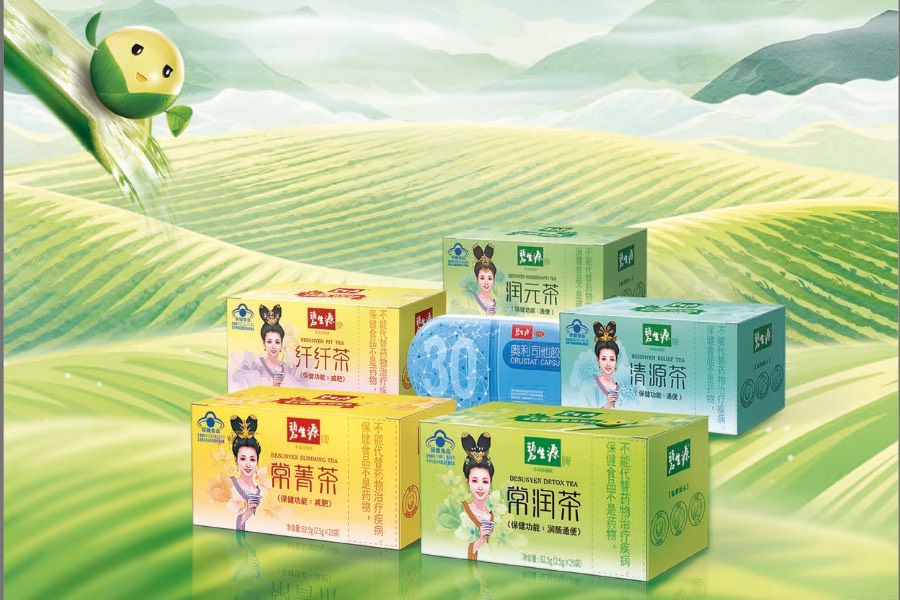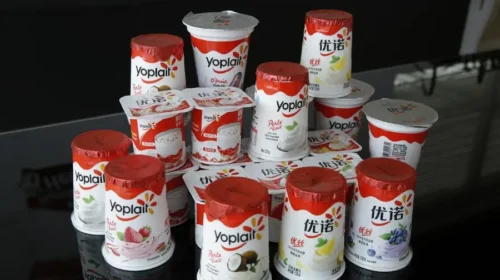From ‘magic tea’ to dietary drugs, can Besunyen reclaim its glory days?

Once a household name known for its ‘slimming tea,’ the company is looking for a new formula in dietary drugs after years of losses and asset sales
Key Takeaways:
- Besunyen logged a net profit of 12.4 million yuan in the first half of 2025, up 46% year-on-year, as its newer line of dietary drugs gained traction
- Revenue from the company’s dietary drug business has risen to 38% of its total, gradually reducing its long-time reliance on tea products
By Lee Shih Ta
It was all the rage for a while, its TV and bus station ads encouraging consumers to “Give your gut a nice bath” and “Be careful not to get too slim.” Riding a wave of popularity from those aggressive campaigns, Besunyen Holdings Co. Ltd. (0926.HK) quickly became synonymous with “slimming tea” products among health-conscious Chinese consumers in the first part of the 21st century.
But those days quickly faded as consumers looked for the next new fad in healthy living. As that happened, Besunyen’s fortunes declined and it fell into years of losses. Now, the company is trying to undergo its own transformation, hoping to cleanse its corporate gut and come up with something new to lure back consumers to its products. It may have found the answer in dietary drugs, which are playing an increasingly important role in its business.
The company’s midyear report, published last week, shows Besunyen’s revenue grew 1.8% in the first half of 2025 to 258 million yuan ($36 million) from 254 million yuan a year earlier. Meager as that may sound, the company made stronger progress in other areas. Its gross profit margin rose from 68.2% to 68.6%, and it reduced its operating expenses by 2.8% to 165 million yuan. Such small improvements filtered down to the bottom line with a 46% rise in the company’s profit to 12.4 million yuan, up from 8.5 million yuan a year earlier.
Such performance falls short of remarkable, since the profit figures are still quite low. But it’s an encouraging start in the company’s nascent turnaround.
Slimming tea leader
To understand how we got to this point, we need to rewind to more than a decade ago when Besunyen was a leader among Hong Kong-listed stocks from the health product sector. The company went public in 2010 as the king of slimming teas that were all the rage at that time, and saw its market value rise as high as HK$5.2 billion ($724 million).
Its two main brands back then were its Changrun Tea and Changjing Tea, whose combined sales reached a staggering 4.35 billion bags by 2017. At its peak, the company presided over a sprawling distribution network with 130,000 distributors, as increasingly health-conscious Chinese kicked off a new era for the country’s dietary health food industry.
But the golden era didn’t last long. In 2016, China’s food and drug regulator issued an official document stating that health products should not contain any functional descriptions in their names, rendering the use of “slimming tea” in a product’s name verboten. As a result, Besunyen had to pull its key products off the market and re-label them, before returning them to store shelves minus their previous familiar names.
Things only got worse as consumers became more educated and rational about the efficacy of such slimming products, which were rapidly being overtaken by more effective beverage-type health products with medicinal or other functional properties.
Besunyen’s brand also began to age, as young consumers increasingly saw the company as yesterday’s health fad. The company’s failure to update its product strategy and brand positioning to keep pace with the competition and changing consumer demands only hastened its fall from grace.
It began losing money as its fortunes rapidly reversed, and to date it has registered more years of losses than profits since its IPO. The company’s annual revenue declined 32.3% to 543 million yuan in 2023, as it recorded a net loss of 299 million yuan – its largest since 2012. The downfall took a toll on Besunyen’s stock, which has lost more than 97% of its value from its record high of HK$105 back in November 2010.
Pharmaceutical pivot
Faced with such a sobering picture, Besunyen made the important decision to change its development focus. In 2015 it acquired Guangzhou Runliang Pharmaceuticals, whose dietary drug Orlistat gave it an entry into the pharmaceutical market. It hoped the move could provide a second important revenue pillar to supplement its older tea business.
While their market is fiercely competitive, dietary drugs enjoy better clinical and functional track records than slimming teas, giving the former an edge in winning consumer trust. With the strategic shift, Besunyen saw pharmaceutical sales take up a growing share of its overall revenue, rising from less than 20% to between 30% and 40% in recent years.
The company’s total revenue fell 10.8% to 484 million yuan last year, with tea products accounting for 326 million yuan, or about two-thirds of the total, while dietary and other drugs made up the remaining one-third at 158 million yuan. Dietary drugs continued to play a bigger role in the first half of 2025, rising 14.5% to 99.2 million yuan, even as tea product revenue fell 2.8% to 159 million yuan. As that happened, tea products fell to 61.7% of total revenue, while dietary drugs rose to 38.3%.
Notably, the company has been selling assets to stay afloat, including its headquarters in Beijing, as well food product subsidiaries. But such sales may be less necessary now, as the company returns to better financial health.
Despite last year’s revenue decline, the company turned a profit of 16.8 million yuan for the period following its aggressive cost-cutting efforts. And as we’ve already noted, its financial profile stabilized further in the first half of the year, with revenue returning to a growth track and its profit rising sharply, albeit from a low base.
Investors have cheered as Besunyen shows signs of returning to financial health. The stock price rose over 25% to HK$3.20 the day after the midyear report’s release, close to a 52-week high and up 39.1% year-to-date. It currently trades at a price-to-earnings (P/E) ratio of 24.3 times, much higher than the 11.6 times for traditional drug stalwart Tong Ren Tang (1666.HK).
That said, the stock could be getting ahead of itself given the company’s wobbly profitability and relatively small net income. It remains to be seen if Besunyen can continue to grow its pharmaceutical business to offset declines in its older tea segment. If it can do that, and also develop other health products to deliver stable profits, then its relatively high valuation might just have legs.
To subscribe to Bamboo Works weekly free newsletter, click here






